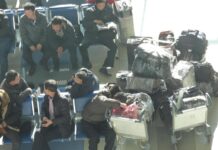
Recently, the number of people complaining of symptoms associated with COVID-19 has risen sharply in several North Korean regions along the border with China. Daily NK has learned of several cases of elderly people and children dying after experiencing COVID-like symptoms.
According to a Daily NK source in North Pyongan Province, the city of Sinuiju has recently seen a spike in the number of people suffering from high fever along with other symptoms such as cough, sore throat, headache, muscle aches, and fatigue.
Local health authorities have attributed these symptoms to influenza. However, these claims are difficult to verify as the authorities lack the equipment to determine whether patients are suffering from influenza or COVID-19.
Many people interpret high fevers of nearly 40 degrees Celsius (104 degrees Fahrenheit) for a week or more as a sign of COVID-19.
Another Daily NK source in Yanggang province said: “Recently, there has been an increase in the number of patients with high fever and cough and more than a few deaths.”
The fact that the majority of deaths have been among the elderly and young children has led many to believe that the latest outbreak is likely to be COVID-19.
Even in cases where the symptoms are particularly severe, the majority of people have to go without medication due to shortages of medicines.
People turn to traditional medicines to relieve symptoms
Western medicines such as Tylenol are not only expensive but are also hard to find. People struggling to make ends meet cannot afford to even think about getting their hands on expensive medicines.
North Koreans can buy domestically produced “Koryo” medicine (traditional Chinese medicine) at pharmacies, but few seek it out because of its relatively low effectiveness, one of Daily NK’s sources explained.
“They say that pharmaceutical factories have sprung up all over the country and are pumping out a large amount of Koryo medicine to improve people’s health, but there is still no medicine for people who are seriously ill. We need imported medicines [now]”.
At the 9th Plenary Session of the 8th Central Committee of the Workers’ Party of Korea in late December, the authorities claimed that “the public health sector has made remarkable contributions in 2023. Through the construction of new pharmaceutical factories, medical product factories, and specialized facilities for disease prevention, we’ve further strengthened the material and technological foundation of the public health sector and created a favorable environment for economic development and people’s daily well-being.”
However, despite the public health and medical achievements touted at the meeting, many people point out that it is a challenge to get proper medicines. In severe cases, it is not uncommon for people to turn to drugs such as opium or crystal meth.
“Imagine a parent forced to give crystal meth to a child with a high fever because they have nothing else to give. It’s frustrating not to know when things will get better,” one of the sources lamented.
Translated by Matthew Eteuati, Jr. Edited by Rose Adams and Robert Lauler.
Daily NK works with a network of sources who live in North Korea, China, and elsewhere. Their identities remain anonymous due to security concerns. More information about Daily NK’s reporting partner network and information-gathering activities can be found on our FAQ page here.
Please direct any comments or questions about this article to dailynkenglish@uni-media.net.


















